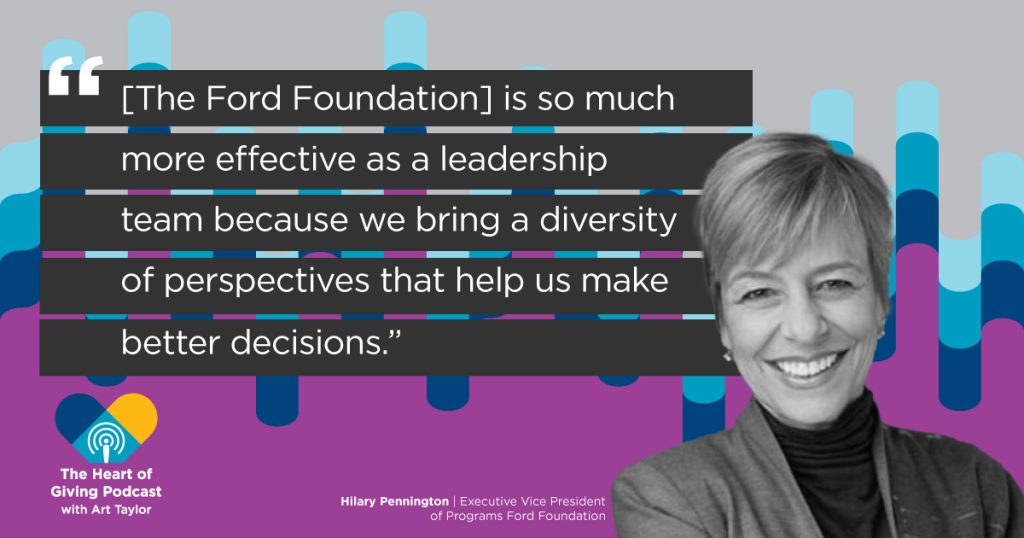Heart of Giving Blog: Interview with Hilary Pennington, Ford Foundation

Economic empowerment is a primary goal of charitable giving, delivering financial resources to organizations and communities. Yet translating grant dollars into lasting social change is anything but simple, raising as many questions as answers. How can philanthropy accomplish significant, long-term outcomes? Furthermore, what drivers and systems of inequality can grants counter? Few are better equipped to address these issues than Hilary Pennington, Executive Vice President of Global Programs at the Ford Foundation. While she now aligns strategy across the Foundation’s global programs, she is a national expert on education and workforce development who has held positions at the Bill and Melinda Gates Foundation and the Center for American Progress. As her interview reveals, though, she has learned that social and cultural transformation is a long struggle. This episode of the Heart of Giving podcast provides insight into her vision for the Ford Foundation’s success:
Looking to the Future: Result-focused philanthropy has been an ongoing theme of Pennington’s career since she co-founded the nonprofit Jobs for the Future. Responding to the decline of manufacturing and widespread pessimism during the 1980s, Jobs for the Future sought to prepare the American workforce for new opportunities through college readiness and training programs. As she discovered from her early work with them and other organizations, emphasis on forward-thinking strategies can involve a careful negotiation for nonprofits. How can they track grant dollars while recognizing that true change may take years, if not decades, to achieve?
Measuring Progress Reasonably: While seemingly crucial, accountability can become a cautionary tale for grant-makers. Pennington questions a common myth that short-term grants enact long-term progress, as well as highly specified metrics that may not capture the comprehensive effect of charitable dollars. Instead, relationship-building between program officers and grantees ensures farther reaching thresholds for measurability, paving the way for greater impact. This shift poses a compelling question for nonprofits. How can they extend the focus of their metrics to include not only specific program outcomes, but also their engagement with broader social problems?
Building Bridges Against Backlash: Born in South Africa and active in anti-apartheid movements during her college years in the United States, Pennington remains aware that promoting racial and social justice can be a long, complex struggle. Major wins often result in pervasive backlash, compelling continual vigilance. The Ford Foundation has responded to this challenge by reshaping itself from the inside out, creating a diverse board that can offer leadership on wide-ranging cultural, social, and economic issues. Their programs extend from education to climate change to land rights for indigenous peoples. The Foundation’s diversity serves as a call to action for others in philanthropy: Does your mission connect diversity and inclusion with performance?
To learn more about the long-term power of grants, listen to this episode of the Heart of Giving podcast here.
This article was composed by Emily Hershman.


